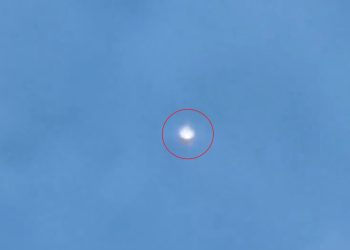Alien civilizations may have colonized Earth before humans ever existed—and if they did, we wouldn’t even know it. That’s the eerie conclusion of a scientific study that reexamines the Fermi Paradox with a haunting possibility: that intelligent life might have come and gone from our solar system millions, or even billions, of years ago.
We often assume we’re the first intelligent species to rise on this planet. But what if we’re just the latest?
A galaxy full of visitors we’ll never meet

Astrophysicist Adam Frank and his team from the University of Rochester developed a model that simulates how alien civilizations might expand throughout the galaxy—including the possibility that Earth was visited long ago. Their study, published on the preprint server arXiv, uses a “settlement model” rather than assuming advanced life would take over everything instantly.
This approach suggests civilizations don’t colonize in one sweep. Instead, they expand slowly, pause, collapse, or retreat. In this model, Earth could have been visited and even colonized before humans evolved—only for the evidence to disappear over deep geological time.
“You can end up with this loose network of settlements,” explains co-author Jason Wright, “where the whole galaxy is settled, but any given star at any given moment might not be.”
No trace left behind
Why wouldn’t we know if alien civilizations may have colonized Earth before humans ever existed? Because the surface of our planet is constantly erasing itself. Earth’s geology is dynamic—erosion, plate tectonics, volcanic activity, and asteroid impacts destroy or bury anything over tens of millions of years.
The study emphasizes the concept of a “finite horizon”—a time limit after which even major surface evidence is unlikely to survive. That means an alien presence 100 million years ago could be completely wiped from the geologic record.
The researchers propose a third answer to the Fermi Paradox—not that aliens never existed, and not that they’re everywhere right now, but that they were here… and left. The Fermi Paradox is the apparent contradiction between the high probability of extraterrestrial life in the universe and the lack of evidence or contact with any such civilizations.
Given the vast number of stars in the galaxy, many of which have Earth-like planets, it seems statistically likely that intelligent life should have emerged elsewhere and perhaps even developed the ability to explore the cosmos. Yet, despite decades of searching, we’ve found no clear signs—no signals, no visits, no artifacts. This paradox raises a haunting question: if intelligent life is common, why is the universe so quiet?
Their simulations revealed three key outcomes:
-
Civilizations may not last long enough to colonize much at all.
-
They may settle the galaxy in fragmented waves.
-
And they may collapse, leaving vast stretches of space—like Earth—empty for eons.
This theory removes the need for ongoing contact. It also explains the eerie silence we hear when we scan the skies for signals. Maybe we’re not alone—we’re just late.
We might be walking on ancient ruins
If alien civilizations ever set foot on Earth long before humans arrived, would we even know? It’s entirely possible we wouldn’t. Any trace of their presence—structures, technology, even biological remnants—could have eroded into dust millions of years before the first dinosaurs appeared.
They might lie buried beneath ancient oceans, swallowed by tectonic shifts, or hidden beneath the layers of time we walk across every day without knowing.
And maybe, some traces have already been found—misinterpreted, overlooked, or filed away as curiosities with no known origin. This isn’t just a thought experiment—it’s a plausible scenario grounded in real scientific modeling of galactic exploration and the limitations of evidence across deep time.
Because if alien civilizations may have colonized Earth before humans ever existed, then the real question isn’t just where are they now? — it’s why did they leave? And perhaps even more haunting: what did they leave behind?











